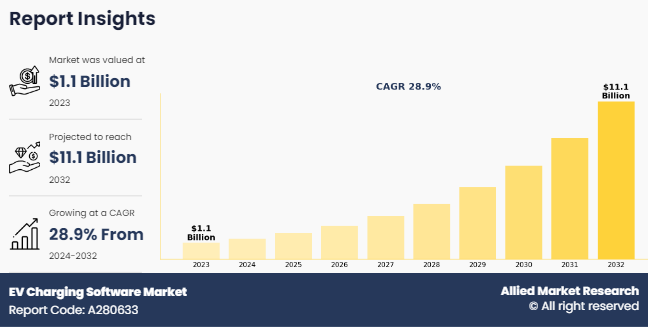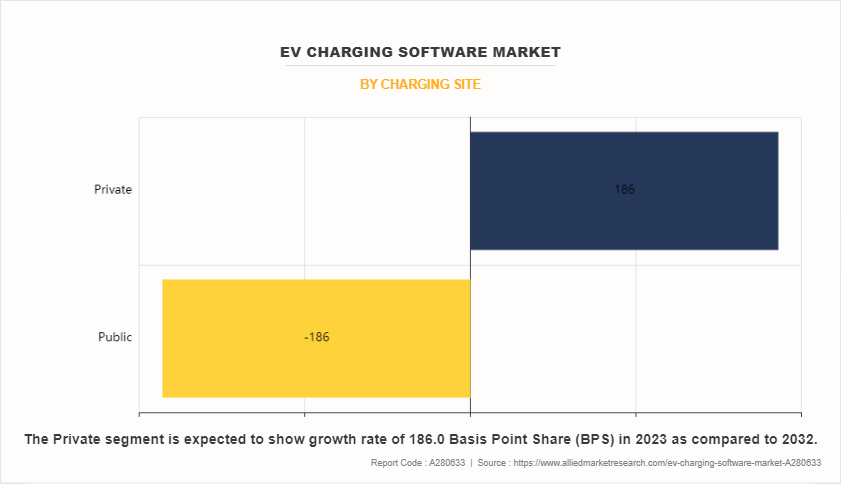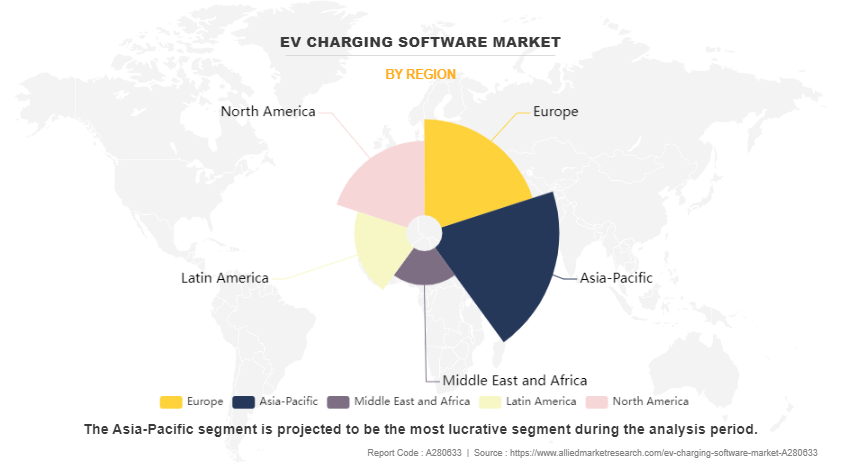EV Charging Software Market Overview
The global EV charging software market size was valued at USD 1.1 billion in 2023, and is projected to reach USD 11.1 billion by 2032, growing at a CAGR of 28.9% from 2024 to 2032.
Electric vehicle charging software enables EV charging operators and e-mobility service providers to manage all aspects of EV charging so they can maximize charger uptime and provide drivers with an exceptional EV charging experience. The software also enables monetization of services for electric vehicle charging providers. It offers several benefits such as more effective charging operations than the private charging infrastructure, new revenue opportunities, customer personalization, and improved operational efficiency. Such factors further create lucrative opportunities for the growth of the global electric vehicle charging software market.

In addition, the operations section of electric vehicle charging software offers the resources required to keep track of the network of chargers, document problems and follow their resolution, and receive notifications from drivers or the infrastructure. In addition, the extensive billing and invoicing system included in EV charging software that can manage multiple payment methods, including credit card payments and prepaid and pay-per-use options. Such factors are anticipated to provide lucrative opportunities for the electric vehicle charging software market growth during the forecast period.
Moreover, growing sales of electric vehicles and rise in government initiatives toward a pollution-free environment are factors expected to propel the growth of the global electric vehicle charging software market. However, the risk of cyber-attacks is anticipated to hamper the growth of global market. On the contrary, rise in implementation of 5G and IoT in charging stations is expected to create lucrative opportunities for the growth of the global market during the forecast period.
Key Takeways:
- By charging site, the public segment accounted for the largest EV charging software market share in 2023.
- By charger type, the level 2 segment accounted for the largest EV charging software market share in 2023.
- By vehicle type, the e-2wheeler segment accounted for the largest EV charging software market share in 2023.
- Region-wise, Asia-Pacific generated the highest revenue in 2023.
Segment Review
The EV charging software market is segmented on the basis of charging site, charger type, vehicle type, and region. By product type, the market is segmented into operation management, energy management, billing and payments, and others. Based on charging site, the market is segmented into public and private. On the basis of charger type, the market is segmented into level 1, level 2, and level 3. On the basis of vehicle type, the market is segmented into e-2wheeler, e-3wheeler, e-car (personal), and e-car (commercial). Region-wise, it is analyzed across North America, Europe, Asia-Pacific, Latin America, and MEA.
The report focuses on growth prospects, restraints, and trends of the EV charging software market analysis. The study provides Porter five forces analysis to understand the impact of various factors, such as bargaining power of suppliers, competitive intensity of competitors, threat of new entrants, threat of substitutes, and bargaining power of buyers, on the EV charging software market.

On the basis of charging site, the EV charging software industry is divided into public and private. In 2023, the public segment dominated the market in terms of revenue, as it offers the charging network availability supports greater utilization and gross revenues, augmenting monetization. Moreover, the private segment is projected to attain the highest CAGR during the forecast period. Private charging solutions offer several benefits such as improved charging capacity, monitoring the electric infrastructure and decrease the upfront cost.

By region, Asia-Pacific dominated the market share in 2023 for the EV charging software market. The presence of technological businesses is insistently influencing the advancement of the EV charging software market size. Moreover, the expansion of advanced technologies such as IoT, cloud computing, and others, which further contribute to the growth of the global market.
Top Impacting Factors
Growing sales of electric vehicles
Rise in the trend of electric vehicles in several countries and among individuals is directly influencing the growth of the global EV charging software market. In addition, with rise in adoption of EVs, there is a growing need for charging facilities to support these vehicles. This includes public charging stations, workplace charging, and home charging solutions. Consequently, EV charging software solutions are gaining significant adoption to increase the use of IT and control systems among business operators, particularly smartphone usage and other digital technologies.
In addition, increased use of smartphones and the internet helps consumers to easily access online platforms, by simply downloading the application on their phones. Such ease of access has contributed to the growth of adoption for the global market, which in turn is expected to contribute to increased installation of EV charging software, globally.
Government initiatives toward a pollution-free environment
Government initiatives aimed at achieving a pollution-free environment play a crucial role in driving the growth of the EV charging software market. Many governments globally offer incentives and subsidies to promote the adoption of electric vehicles and the development of EV charging infrastructure. These incentives may include grants for installing charging stations, tax credits for purchasing electric vehicles, and subsidies for EV charging infrastructure development. Availability of such incentives encourages investment in EV charging software solutions to support the expanding charging infrastructure.
In addition, government agencies often allocate public funds for the deployment of public EV charging infrastructure in urban areas, highways, and other strategic locations. As part of these initiatives, governments may also invest in EV charging software platforms to ensure the effective management and utilization of the charging infrastructure. This funding contributes to the EV charging software market growth.
Risk of cyber attacks
Data security and privacy concerns are the key constraints for the growth of the EV charging software market. Security and privacy maintenance of data have become complex with the increasing amount of data produced by software solutions. For instance, in April 2021, Facebook reported a breach affecting 100 million user records that was publicly exposed on Amazon cloud computing service. In addition, storing sensitive data on cloud servers raises concerns about unauthorized access and potential data breaches. If a cloud provider's security measures are compromised, it may lead to the exposure of sensitive information, causing reputational damage and financial losses.
Further, while EV charging software offers numerous benefits such as flexibility, scalability, and cost-effectiveness, organizations and individuals often hesitate to fully adopt EV charging software solutions due to data security and privacy threats. These threats include the infiltration of malware through removable media and external hardware, human error and sabotage, social engineering and phishing, distributed denial-of-service (DDoS) attack, technical malfunction, force majeure, and others. These threats cause business operations to be restricted in an unplanned manner, which negatively impacts punctuality and the allocation of resources in EV charging software solutions.
Competition Analysis:
Competitive analysis and profiles of the major players in the global EV charging software market include ChargePoint, Inc., EVBox, EVConnect, Shell Recharge Solution, ChargeLab, Inc., Siemens AG, Tesla, Centrica, Driivz Ltd., and Eaton Corporation. These major players have adopted various key development strategies such as business expansion, new product launches, and partnerships, which help to drive the growth of the EV charging software market globally.
Recent Developments in EV Charging Software Industry
In August 2023, FreeWire Technologies launched Mobilyze Pro, an AI-enabled platform designed to provide accurate predictions to efficiently and profitably expand nationwide EV charging infrastructure. The platform's new tools, including a utilization prediction engine, a tariff recommendation engine, and a profitability calculator, leverage AI to parse through public and proprietary datasets to predict the best locations to deploy EV fast charging.
In November 2023, EVCS partnered with Lyft, to launch a new partnership program. EV drivers on Lyft can benefit from discounted charging on the EVCS network, helping rideshare EV drivers realize significant savings.
Key Benefits for Stakeholders
This report provides a quantitative analysis of the market segments, current trends, estimations, and dynamics of the EV charging software market forecast from 2023 to 2032 to identify the prevailing market opportunities.
Market research is offered along with information related to key drivers, restraints, and opportunities of EV charging software market outlook.
Porter's five forces analysis highlights the potency of buyers and suppliers to enable stakeholders to make profit-oriented business decisions and strengthen their supplier-buyer network.
In-depth analysis of the EV charging software industry segmentation assists in determining the prevailing EV charging software market opportunity.
Major countries in each region are mapped according to their revenue contribution to the global market.
Market player positioning facilitates benchmarking and provides a clear understanding of the present position of the market players.
The report includes an analysis of the regional as well as global EV charging software market trends, key players, market segments, application areas, and market growth strategies.
EV Charging Software Market Report Highlights
| Aspects | Details |
| Forecast period | 2023 - 2032 |
| Report Pages | 300 |
| By Charging Site |
|
| By Charger Type |
|
| By Vehicle Type |
|
| By Region |
|
| Key Market Players | ChargePoint, Inc., Tesla, EVBox, EVConnect, Shell Recharge Solution, Driivz Ltd., Centrica, ChargeLab, Inc., Eaton Corporation plc, Siemens AG |
Analyst Review
As the EV charging software market continues to evolve, CXOs are evaluating the opportunities and challenges regarding this emerging technology. Enterprises recognize the importance of current advances in communication technologies, and the EV charging software market growth is expected to be impacted by these advances in networking solutions and wireless communication protocols.
Businesses are considering the benefits that EV charging software solutions can offer, including the capability to provide an effective means to process the data, preserve legal compliance, and decrease the potential of data breaches and unauthorized access. In addition, implementing effective EV charging software solutions help rails to maintain the privacy and authenticity of data, safeguarding their enterprise reputation and avoiding potential legal consequences. Such factors are expected to provide lucrative opportunities for the market growth during the forecast period.
Furthermore, the integration of Internet of Things (IoT) and industry 4.0 principles into electric vehicle software systems is driving the demand for global market. However, businesses also recognize the challenges associated with EV charging software solutions. One potential risk is the complexity and usability challenges. This type of software is complicated to deploy and use and is expected to require technical knowledge and additional processes to encrypt and decrypt data, which can make it challenging for organizations to enhance their product offerings in charging services. In addition, EV charging software solutions require significant investment in security infrastructure and technological expenses, which can be a major restraint for the global market.
Furthermore, rise in concerns regarding interoperability issues is expected to limit the global market growth. There could be incompatibilities between the regulatory standards and protocols used by various communication solutions, which further hinders the growth of the global EV charging software market. Businesses must integrate software or applications by specific standards and protocols. By addressing these challenges, businesses can unlock the full potential of EV charging software solutions to transform their charging operations, create value, and gain a competitive advantage in their industry. For instance, in August 2023, EV Connect launched EV Connect Service platform. The service platform enables companies to build, scale, and manage EV charging operations with versatile monetization options and a comprehensive suite of software and support services that equip organizations with the tools to succeed in an increasingly competitive EV charging industry.
Rise in the trend of electric vehicles in several countries and among individuals is directly influencing the growth of the global EV charging software market. In addition, with rise in adoption of EVs, there is a growing need for charging facilities to support these vehicles. This includes public charging stations, workplace charging, and home charging solutions.
The leading application of EV (Electric Vehicle) charging software market is in managing and optimizing electric vehicle charging infrastructure. This includes software solutions for charging station management, billing and payments, energy management, and data analytics. EV charging software helps businesses and governments efficiently operate, monitor, and monetize electric vehicle charging stations, contributing to the growth and adoption of electric vehicles by providing convenient and reliable charging services.
Asia-Pacific is the largest regional market for EV Charging Software
$11.1 Billion is the estimated industry size of EV Charging Software.
ChargePoint, Inc., EVBox, EVConnect, Shell Recharge Solution, ChargeLab, Inc., Siemens AG, Tesla, Centrica, Driivz Ltd., and Eaton Corporation. are the top companies to hold the market share in EV Charging Software
Loading Table Of Content...
Loading Research Methodology...



